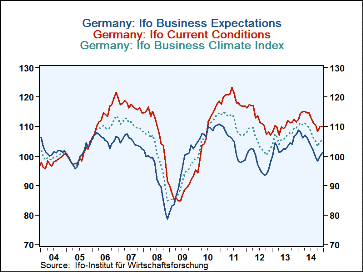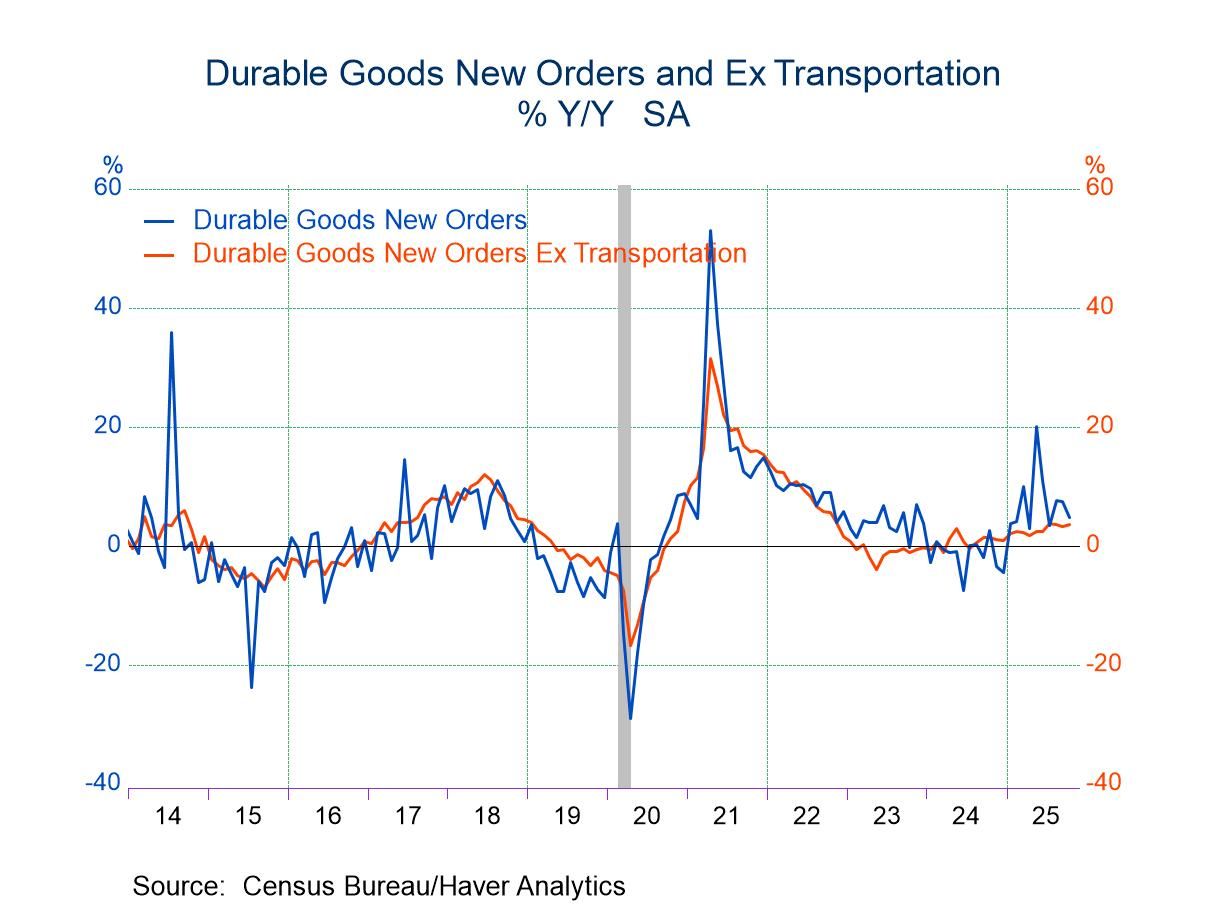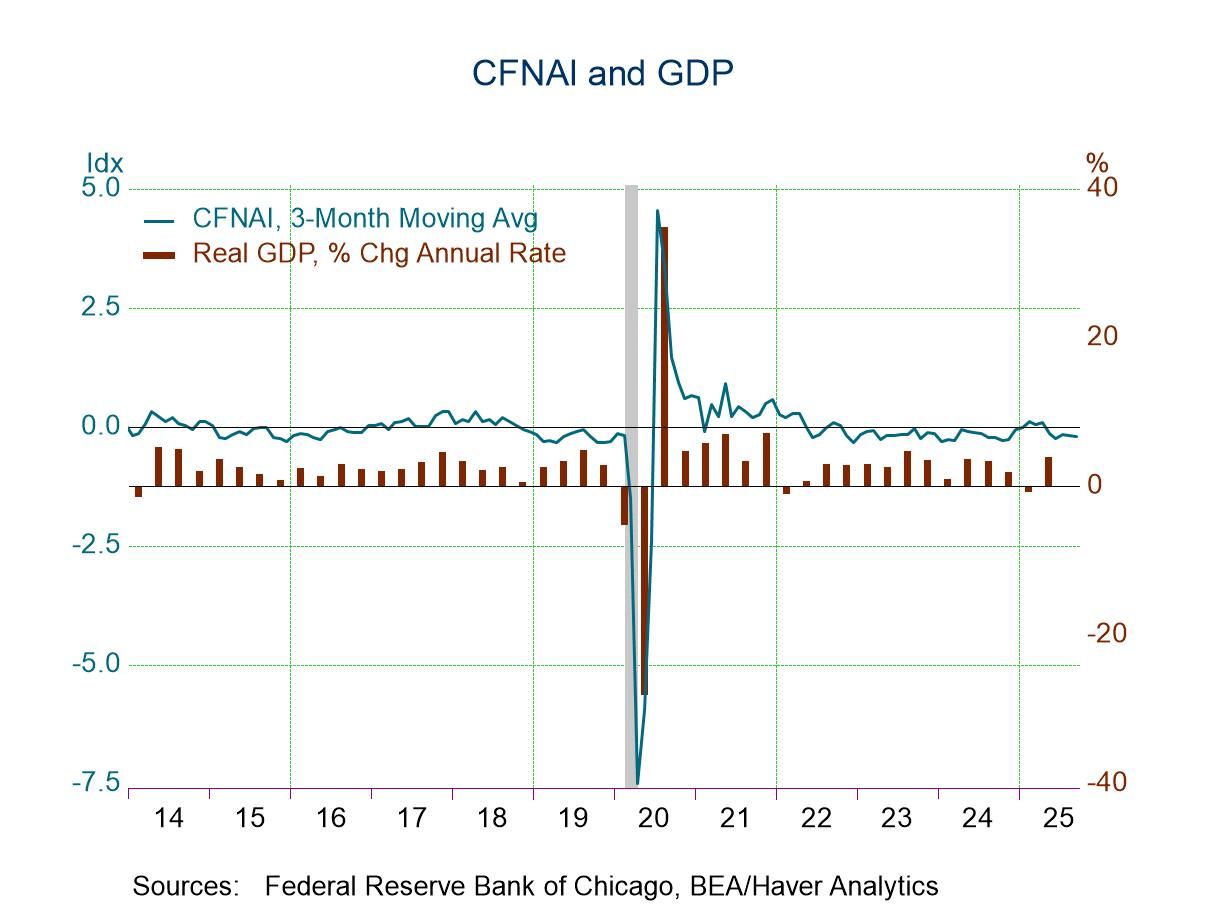 Global| Dec 18 2014
Global| Dec 18 2014German Ifo Bounces in December
Summary
The chart plots the Ifo indices and you can easily see that the climate, current and expectations indices bounced higher in December from a local low in November. The index readings are still weak in the sense of being lethargic, not [...]
 The chart plots the Ifo indices and you can easily see that the climate, current and expectations indices bounced higher in December from a local low in November. The index readings are still weak in the sense of being lethargic, not in the sense of heading for recession.
The chart plots the Ifo indices and you can easily see that the climate, current and expectations indices bounced higher in December from a local low in November. The index readings are still weak in the sense of being lethargic, not in the sense of heading for recession.
In the table, we chronicle the diffusion indices that are the counterparts for the same overall Ifo indices that are plotted in the chart. There we see that the current conditions index is flat. The expectations index improved to -1.2 from -3.9. It still has a negative reading (more expecting poorer conditions than expecting improved conditions). But there is an improvement in the outlook nonetheless. The all-sector climate index rose to 3.7 from 2.3.
Still, the overall gauges are moderate to weak. The all-sector climate gauge sits in the 67th percentile of its historic queue of values. The expectations index sits in its 48th percentile and is below its historic median (which is at 50%). The current index however stands in its 72nd percentile, a relatively firm reading. At that level, current conditions are only better 28% of the time historically. So the German economy is still doing pretty well, but its expectations are nagging.
Turning to sectors, manufacturing moved up relatively strongly in December, rising to 6.4 from 3.9. But this gain still leaves manufacturing in its 48th queue percentile, still below its historic median. It is, on this basis, the weakest sector of all. But the weak euro exchange rate may be breathing some life into German manufacturing. Wholesaling improved to a reading of 7.2 in December from 6.1 in November. It sits in the 76th queue percentile, a relatively firm reading. Construction slipped to -6.2, weaker than its November value of -5.9. But even at that weakened and negative value, the sector stands in its 85th queue percentile, a testament to how weak the sector has been. Retailing also slipped in December, falling to a level of -3.3 from -1.7 in November. The sector stands in its 70.6 percentile and is losing its sense of firmness as it slips toward the 70th percentile level.
Germany is still in the cross currents of EMU weakness. We have seen in recent weeks the continued slippage of the Russian economy and the plunge in the ruble as oil prices worldwide remain weak. Now the ruble has problems beyond oil. Germany has some important trade with Russia so this matters to Germany. In addition, the geopolitical situation with Russia remains quite unsteady and Putin has not moved one inch toward any kind of rapprochement with the West or with Ukraine. Quite the contrary, Russia continues to have an active air-force presence in the Baltic region. All of this is geopolitically unsettling.
Apart from the geopolitics of the region, economic circumstances are still weak across the euro area. This weakness has brought with it a weaker euro and with that the German manufacturing sector is showing some life in this survey.
The plot of the level of the Ifo indices is a bit reassuring in that while the Ifo index is weak and has been slipping it is still far from any levels that would raise concerns about recession plus it rebound this month. Manufacturing is the weakest sector in Germany and yet it made a relatively strong month-to-month gain in December. Germany may be struggling, but it is still growing and its current circumstances are still quite acceptably firm for Germany and at the same time the envy of most of Europe.

Robert Brusca
AuthorMore in Author Profile »Robert A. Brusca is Chief Economist of Fact and Opinion Economics, a consulting firm he founded in Manhattan. He has been an economist on Wall Street for over 25 years. He has visited central banking and large institutional clients in over 30 countries in his career as an economist. Mr. Brusca was a Divisional Research Chief at the Federal Reserve Bank of NY (Chief of the International Financial markets Division), a Fed Watcher at Irving Trust and Chief Economist at Nikko Securities International. He is widely quoted and appears in various media. Mr. Brusca holds an MA and Ph.D. in economics from Michigan State University and a BA in Economics from the University of Michigan. His research pursues his strong interests in non aligned policy economics as well as international economics. FAO Economics’ research targets investors to assist them in making better investment decisions in stocks, bonds and in a variety of international assets. The company does not manage money and has no conflicts in giving economic advice.






